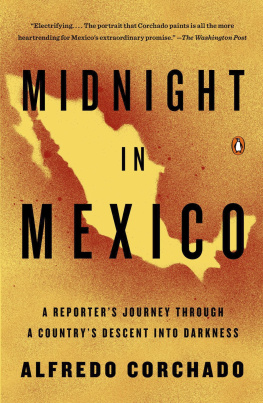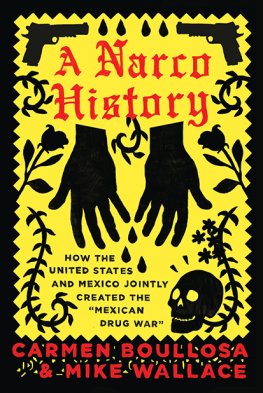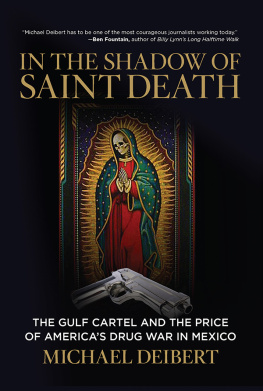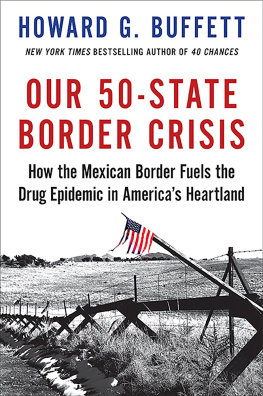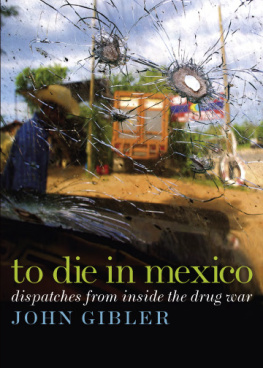First published in the United States of America by The Penguin Press, a member of Penguin Group (USA) Inc., 2013
Penguin supports copyright. Copyright fuels creativity, encourages diverse voices, promotes free speech, and creates a vibrant culture. Thank you for buying an authorized edition of this book and for complying with copyright laws by not reproducing, scanning, or distributing any part of it in any form without permission. You are supporting writers and allowing Penguin to continue to publish books for every reader.
Corchado, Alfredo.
Midnight in Mexico : a reporters journey through a countrys descent into darkness / Alfredo Corchado.
pagescm.
Includes index.
1. Corchado, Alfredo. 2. Drug trafficMexico. 3. Organized crimeMexico. 4. Investigative reportingMexico. I. Title.
Penguin is committed to publishing works of quality and integrity. In that spirit, we are proud to offer this book to our readers; however, the story, the experiences, and the words are the authors alone.
To Herlinda and Juan Pablo, my parents, for teaching me the art of believing against all odds
INTRODUCTION
B efore I had written the first words of this book, John D. Feeley, a veteran American diplomat with deep, proud Irish and Italian roots and a big heart for Mexico, asked me what my book would be about. I rattled off a list of themes I hoped to cover, from immigration into the United States, to the ongoing violence and corruption in a country I once thought I knew, to the role of the United States in shaping Mexicos destiny.
Feeley grinned. Youre making mole, he said, referring to the traditional sauce made from any number of ingredients, from almonds to chocolate to pipin chili, all blended to create a uniquely Mexican flavor. I told John I had no idea how to make mole, but I would pour every bit of my soul into these pages.
Great, he said. Stories heal you and others.
Midnight in Mexico is my attempt to investigate the complex questions facing my country. These challenges marked me first as a boy and then as a reporter. This isnt meant to be a comprehensive history of arguably the most transformative time in Mexico since the revolution of 1910. But in my half century on Mexican and U.S. soil, I have had a front-row seat to great change. This book offers a glance at some of the moments when the Mexican people stood between hope and fear.
During my career as a journalist, I have been blessed. I reported on Mexico as much as I could while I was based in the States. But in 1994 I came to live and work in Mexico City permanently. Since then, four presidentsCarlos Salinas de Gortari, Ernesto Zedillo, Vicente Fox and Felipe Caldernhave governed the country. I knew all of them, some better than others. Three milestones marked the period and defined my work: the 1994 North American Free Trade Agreement, the 2000 election that ushered in the first changeover in power in seven decades, and the ongoing battle against the cartels and the culture of violence they spawned. Hope and fear. Fear and hope.
By the time this book is published, nearly one hundred thousand people will have disappeared or been killed since President Caldern launched a war on the cartels. When it began in 2006, the new president promised that an increasingly violent Mexico would at last become a nation of laws. The situation was dire. Less than 20 percent of those detained on drug trafficking charges in Mexico were convicted. Cops were underpaid and undertrained and forced to rely on bribes as a way to put food on the table. Inequality marred the countrys future and left too many living on too little. Mexicos low rates of tax collection left limited funding for infrastructure or social programs. The education system was run by a corrupt union. Millions of young men and women were ripe for recruitment by drug traffickers.
M idnight in Mexico draws on my reporting from 1986 to the present, beginning with the now extinct El Paso Herald-Post; I continue to blame the Herald-Post for infecting me with the incurable disease of journalism. I also relied on reporting I did out of Mexicooften on my vacation timefor the Wall Street Journal. Most of the work represents the eighteen years I have been honored to report for readers of the Dallas Morning News. In 1994, the newspaper hired me for what it said was a foreign correspondent job. To this day it still feels like a dream come true. But the term foreign correspondent is a bit misleading. Mexico has never been foreign to me. Mexico has always been personala story not necessarily of two countries but of one people.
I am a son of Mexico. I come from a typically large Mexican familyIm the eldest of nine. Tradition in my Durango town of San Luis de Cordero dictated that our ancestors bury the umbilical cord of every newborn to remind usespecially those destined to leaveof a place of first sunsets and sunrises: No matter how far I traveled, Id never forget. More than half the towns population of two thousand worked in the United States at some pointamong them, my father, a bracero, part of a generation of temporary guest workers whose sweat slowly transformed the face of the United States.
I arrived in the United States in 1966, kicking and screaming, pledging to my parentsJuan Pablo and Herlindathat one day Id return to Mexico and prove them wrong about the promise of the United States. Id echoed the words of my To Delfino, who refused to go north. He reminded us that Mexico wasnt cursed by history but by betrayal. My parents proved my distrust of the United States wrong by giving us the possibility of reinvention in a new land.
In Californias San Joaquin Valley, my father drove tractors and my mother stooped over a short hoe weeding fields of sugar beets and lettuce. My brothers and I joined her picking every imaginable crop to help keep America fed. We grew up cramped in a trailer house surrounded by fields of melons. Later my parents took our dreams to El Paso, a city along the U.S.-Mexico border, across from Ciudad Jurez.
The excitement of that place was a catalyst for an aspiring journalist, the profession that paved my way home. From my parents small restaurant, Freddys Caf, three blocks from the international bridge, I plotted my return to Mexico. As a student at El Paso Community College, followed by the University of Texas at El Paso and later as a reporter for the Herald-Post, I crisscrossed the border and shook with excitement at what, throughout the 1980s, felt like a peoples revolution taking place just feet from U.S. soil. I was inspired by men and women hell-bent on reclaiming a nation beset by one-party rule, a powerful oligarchy and entrenched monopolies.
Even when I went north to further my career, Mexico remained close. In Philadelphia, where I worked in the Wall Street Journals regional bureau, Id spend long winter nights alongside my new friends Ken Trujillo, David Suro and Primitivo Rodriguez. At the time, we believed we were the only four Mexicans in Center City, where we talked about the same big ideas of what Mexico could be as we nursed tequila. We were nostalgic about our

